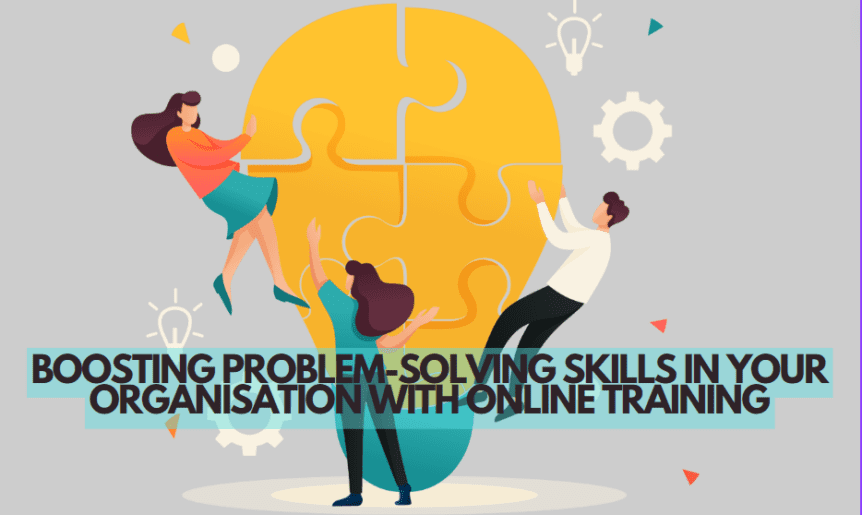Boosting Problem-Solving Skills in Your Organisation with Online Training
Problem-solving skills are beneficial to your organisation across just about every job role and responsibility. With optimised problem-solving skills, your employees can work more efficiently and autonomously while achieving better outcomes. You can give problem-solving skills in your organisation a boost through online training.
E-learning courses on problem-solving skills can benefit employees at all levels. While individuals in your organisation will have different problem-solving capabilities, everyone can improve their problem-solving skills.
The Benefits of Improving Problem-Solving Skills in Your Organisation
- Dealing with complex issues – employees will be better equipped to deal with complex issues, including issues they may not have encountered before.
- Discover roadblocks – roadblocks can exist in all organisations and while some are obvious, others are harder to spot. Good problem-solving skills will help your employees identify the roadblocks that are holding your business back.
- Reduces business risks – better problem-solving skills across your organisation can help reduce commercial risks, compliance risks, safety risks, and other common business risks.
- Improves efficiency – problems can take time to resolve, and they are also a distraction. Good problem-solving skills will help your team get to satisfactory resolutions quickly so they can get back to more value-adding tasks.
- Better customer service – many of the most pressing problems faced by companies involve customers. When your team can quickly and efficiently get to satisfactory resolutions, you will see customer satisfaction levels improve.
- Improves competitiveness – good problem-solving skills can make your organisation more flexible and agile, enhancing its ability to compete.
- Increases creativity and innovation – the process of resolving problems can involve creativity, while the resolution itself could lead to new ideas and innovations.
- Improves employee satisfaction – when employees can resolve problems on their own, they will feel a higher sense of ownership and better motivation.
- Improves leadership – leadership and management are often about solving problems, so improving problem-solving skills will enhance the abilities of your leaders and managers.
- Improves critical thinking – solving problems often requires thinking outside the box, so critical thinking abilities can also improve as problem-solving skills improve.
6 Key Components of Problem-Solving Skills
There are six key components that you should focus on when working to improve the problem-solving skills of your employees.
- Identifying problems
- Identifying root causes
- Identifying constituent parts
- Designing solutions
- Implementing solutions
- Evaluating outcomes
Identifying Problems
Some problems are obvious and unavoidable, but there are others that require good problem-solving skills to identify. Those that are less obvious can be a major hindrance to the company that others have simply learned to live with. Identifying and then resolving these problems can make a significant positive difference.
Identify Root Causes
Charging in to solve a problem is rarely effective as the solution may only skim the surface. The best approach is usually to take time to identify the main cause, often by listening. It is then easier to develop a solution that will deliver an effective resolution.
Identifying Constituent Parts
Some problems, especially those that are large and complex, are best resolved by breaking them up into their main parts. Each part can then be looked at individually, rather than getting overwhelmed by the problem as a whole.
Designing Solutions
Identifying or recognising problems and their main causes is only part of the process, as you then need to design solutions. Not just any type of solution, either, as solutions must be within acceptable guidelines, and they must be effective.
Implementing Solutions
Problem-solving can fail in the implementation of the solution, so it is important employees are able to deliver the resolution and see it through to a conclusion.
Evaluating Outcomes
The final key element is to evaluate outcomes to identify shortcomings in the resolution and to learn for the future.
How to Use E-Learning to Improve Problem-Solving Skills in Your Organisation
Some of the ways you can use e-learning to improve problem-solving skills in your organisation include:
- Scenarios – add scenarios to your e-learning courses, especially branching scenarios. Branching scenarios don’t have a linear pathway. Instead, the various stages of the exercise are dependent on previous responses. With branching scenarios, learners can be presented with problems, including complex problems, and will be able to see how decisions and actions at each stage of the process influenced the outcome, both positively and negatively.
- Provide constructive feedback – telling a learner they are either right or wrong doesn’t do much to help them develop problem-solving skills, especially in exercises where problem-solving is a key component (such as branching scenarios, as mentioned above). Constructive feedback is much more beneficial, where the learner gets an explanation of why they were right or wrong.
- Collaborative projects – setting collaborative projects where learners have to work together is another good way of letting learners practice and improve their problem-solving skills.
- AI tutor – adding an AI tutor to your e-learning courses will give learners another tool to help them resolve problems and challenges that you set for them. The AI tutor can be set up to answer questions in a way that helps the learner progress through the problem while improving their knowledge and abilities in the process.
Ongoing Benefits
With online training and e-learning, you can improve the skills of your employees by including problem-solving elements in your e-learning courses. You can also create a specific problem-solving skills development e-learning course. Whatever approach you take, the process of improving problem-solving skills in your organisation should be ongoing, and the benefits will be ongoing too.
